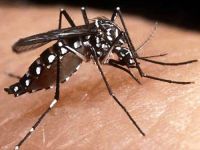Dengue: Partial success against a monster
The world's first vaccination programme against Dengue fever in Thailand was successful against 3 of the 4 strains. The trial was carried out among 4,000 children in Thailand and revealed a very good safety profile, according to the company manufacturing the vaccine and doing the trial, Sanofi. The fourth strain unfortunately is the most common.

Dengue fever. Fix the name because it is the growing killer of the 21st century and it is growing as the climate gets warmer. No longer just a tropical disease, it is now endemic in the United States of America and it has a hemorrhagic form, like Ebola. Nasty. The good news is that a first attempt at a vaccination programme has been successful. The bad news is that it has only been successful in three out of four types.
The world's first vaccination programme against Dengue fever in Thailand proved successful against three of the four strains of the disease. The trial was carried out among four thousand children in Thailand and revealed a very good safety profile, according to the company manufacturing the vaccine and carrying out the trial, Sanofi.
Dengue fever infects between 50 and 100 million people every year, threatening 2.4 billion people who live in the semi-tropical and tropical areas most affected. Spread by the Aedes aegypti mosquito, there are four viruses that cause the disease, the most serious one being severe dengue, which has Ebola-like hemorrhagic symptoms.
There is no known cure, but the Sanofi trials will go a long way towards protecting the people living in areas where Dengue is endemic and protecting visitors to those areas. The trials revealed the production of antibodies against all four strains of the virus, providing protection against three of the strains.
The second phase of the trials is now taking place, involving 31,000 people in 10 countries in Asia (Indonesia, Malaysia, Philippines, Thailand, Vietnam) and Latin America (Brazil, Colombia, Honduras, Mexico, Puerto Rico).
However, the scientific community is concerned because the three strains covered by the vaccine are precisely the less frequent ones and the one that has escaped the loop, is the most common. The concern is not unfounded: exposure to one strain, or serotype, usually results in flu-like symptoms for a week and immunity against the same serotype in future.
However, there is a tendency for exposure to a different serotype at a future date resulting in severe dengue, or hemorrhagic fever. This strain has Ebola-like symptoms and causes 500,000 victims a year.
Worse, there is another school of thought which states that an imperfect vaccination programme can make severe Dengue fever more virulent. Given the results of the first programme in Thailand, we can see the causes for concern: Serotype 1 saw infection rates cut by 55.6%; Serotype 3 saw infection rates cut by 75.3%, Serotype 4 saw infection rates cut by 100%.
Serotype 2: near zero protection. #2 is the most prevalent serotype in the world. Could it also be that a massive vaccination programme against serotypes 1,3 and 4 will make #2 run out of control and morph into something else?
What happens when we play around with things we do not understand fully... but then again, the lobbies and their profits are more important, are they not?
Timothy Bancroft-Hinchey
Pravda.Ru
Subscribe to Pravda.Ru Telegram channel, Facebook, RSS!


